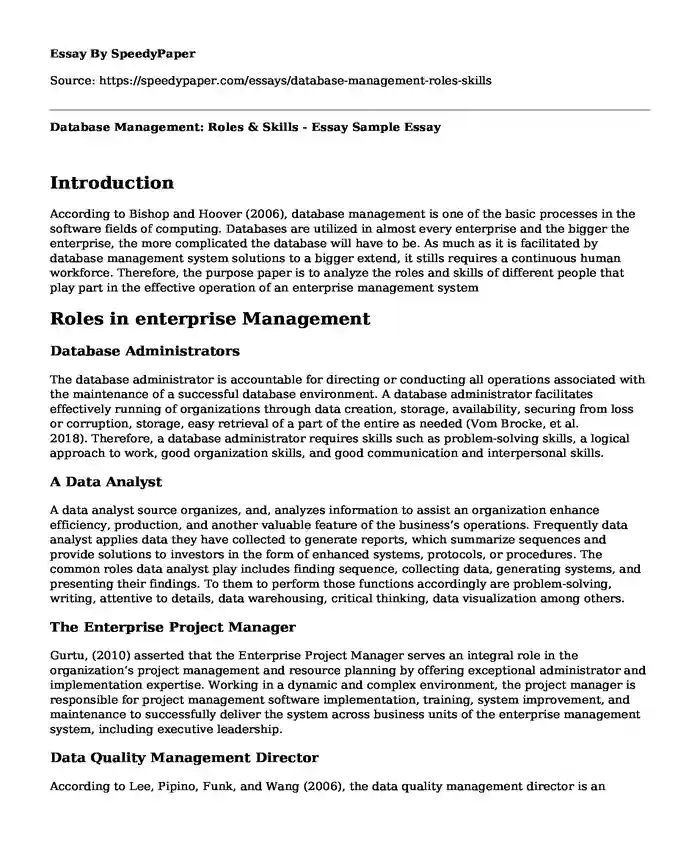
| Type of paper: | Essay |
| Categories: | Management Data analysis Science |
| Pages: | 3 |
| Wordcount: | 744 words |
Introduction
According to Bishop and Hoover (2006), database management is one of the basic processes in the software fields of computing. Databases are utilized in almost every enterprise and the bigger the enterprise, the more complicated the database will have to be. As much as it is facilitated by database management system solutions to a bigger extend, it stills requires a continuous human workforce. Therefore, the purpose paper is to analyze the roles and skills of different people that play part in the effective operation of an enterprise management system
Roles in enterprise Management
Database Administrators
The database administrator is accountable for directing or conducting all operations associated with the maintenance of a successful database environment. A database administrator facilitates effectively running of organizations through data creation, storage, availability, securing from loss or corruption, storage, easy retrieval of a part of the entire as needed (Vom Brocke, et al. 2018). Therefore, a database administrator requires skills such as problem-solving skills, a logical approach to work, good organization skills, and good communication and interpersonal skills.
A Data Analyst
A data analyst source organizes, and, analyzes information to assist an organization enhance efficiency, production, and another valuable feature of the business’s operations. Frequently data analyst applies data they have collected to generate reports, which summarize sequences and provide solutions to investors in the form of enhanced systems, protocols, or procedures. The common roles data analyst play includes finding sequence, collecting data, generating systems, and presenting their findings. To them to perform those functions accordingly are problem-solving, writing, attentive to details, data warehousing, critical thinking, data visualization among others.
The Enterprise Project Manager
Gurtu, (2010) asserted that the Enterprise Project Manager serves an integral role in the organization‘s project management and resource planning by offering exceptional administrator and implementation expertise. Working in a dynamic and complex environment, the project manager is responsible for project management software implementation, training, system improvement, and maintenance to successfully deliver the system across business units of the enterprise management system, including executive leadership.
Data Quality Management Director
According to Lee, Pipino, Funk, and Wang (2006), the data quality management director is an individual who is accountable for coordinating activities to achieve these standards of quality. Also known as quality assurance manager offers advice on how these quality systems are controlled, they present performance, and they protect against set standards. Further, he formulates policy standards and maybe a Marketing operation or Salesforce.
Enterprise Information Management Specialist
Enterprise information management specialist communicate and collaborate with investors for allocated activities facilitating all the investors are updated for activity status and that comment is taken into consideration when appropriate.
Analysis of Relationship between the Role
Data analyst
Fig 1: an illustration of interconnection of the different roles in enterprise management system
Enterprise management system works swiftly by recreating interconnection between various roles and enterprise. Enterprise system management system is a system –scale application software packages that address the different software needs of a large organization. Interconnection is defined as a network of data systems that joins physical and internet-based, permitting enterprises to share resources and digital information across several locations and servers (Venkata, Maheshwari, Abdul, & Kandasamy, 2017). Therefore, the system permits it, teams, to support and maintain large, complex, and geographically –dispersed IT infrastructure and application. Enterprise management system covers every facet of an enterprise, from operations to customer service, to data security, and social media. Thus, creating new jobs such as data analysts, information security specialists, business intelligence, data architects among others.
References
Bishop, D. A., & Hoover, K. M. (2006). U.S. Patent No. 6,983,317. Washington, DC: U.S. Patent and Trademark Office. https://patents.google.com/patent/US6983317B1/eN
Gurtu, A. (2010). Enterprise Project Management. Project Management Institute. https://www.researchgate.net/profile/Amulya_Gurtu/publication/281111455_Enterprise_Project_Management/links/55d62d3f08aed6a199a4c42b.pdf
Lee, Y. W., Pipino, L., Funk, J. D., & Wang, R. Y. (2006). Journey to data quality (pp. 137-150). Cambridge, MA: MIT press. https://ekut.pw/uploads-journey-to-data-quality.pdf
Venkata, B. K. J., Maheshwari, H., Abdul, M. R. G. M., & Kandasamy, P. (2017). U.S. Patent No. 9,749,311. Washington, DC: U.S. Patent and Trademark Office. https://patents.google.com/patent/US9749311B2/en
Vom Brocke, J., Maaß, W., Buxmann, P., Maedche, A., Leimeister, J. M., & Pecht, G. (2018). Future work and enterprise systems. Business & Information Systems Engineering, 60(4), 357-366. https://link.springer.com/article/10.1007/s12599-018-0544-2
Cite this page
Database Management: Roles & Skills - Essay Sample. (2023, Nov 28). Retrieved from https://speedypaper.com/essays/database-management-roles-skills
Request Removal
If you are the original author of this essay and no longer wish to have it published on the SpeedyPaper website, please click below to request its removal:
- Free Essay Including Questions on Crisis Management and Job Interviews
- Lab Report Essay Example
- Western Civilization Essay Example
- Essay Example Describing Lewis and Clark Expedition
- Essay Sample on How Mcleod Should Handle Dilemma
- Bigotry: A Legacy of the West and Its Power Over Humankind - Essay Sample
- Data-Based Statistical Study. Free Essay
Popular categories




